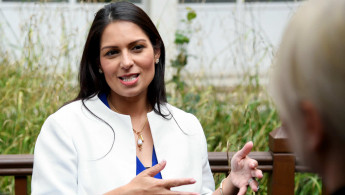'Peeking Priti' wants the UK government to spy on your WhatsApp messages
Patel's appointment last week by new Prime Minister Boris Johnson has been widely criticised as the disgraced former International Development secretary was forced to resign after conducting unauthorised meetings with Israeli officials.
At the Five Eyes security summit, which took place on Monday and Tuesday, senior ministers from the UK, Australia, Canada, New Zealand and the US met with tech industry leaders to discuss security concerns.
Patel urged the tech firms not to "empower criminals" with their technology, The Independent reported.
The home secretary believes that end-to-end encryption - which means that only the sender and receiver can see the contents of a message - shields criminals from investigation.
Apps such as WhatsApp and Telegram, both of which use end-to-end encryption, should grant law enforcement agencies a "back door" to view messages related to criminal activity, Patel said.
As the platform itself cannot read or see the encrypted messages, there is no current "back door" access.
Read more: Boris Johnson's new cabinet is a roll call of disgraced Tories
Facebook is also planning to install end-to-end encryption on its services Facebook Messenger and Instagram Direct.
"This is not an abstract debate: Facebook's recently announced plan to apply end-to-end encryption across its messaging platforms presents significant challenges which we must work collaboratively to address," Patel said.
"The use of end-to-end encryption in this way has the potential to have serious consequences for the vital work which companies already undertake to identify and remove child abuse and terrorist content."
Encryption also "hampers" the work of law enforcement agencies to "identify and stop criminals abusing children, trafficking drugs, weapons and people, or plotting terrorist attacks", she said.
Patel did not make clear how such a "back door" would be used. Theoretically the encryption loophole would allow technology companies full access to all users' messages.
Former Home Secretary Amber Rudd also called for a "back door" to encrypted apps back in 2017.
Critics say the move, if realised, would weaken security for all users in order to target a slim minority.
Patel's call for a "back door" was repeated by the Five Eyes countries in a comunique released at the end of the summit.
"Tech companies should include mechanisms in the design of their encrypted products and services whereby governments, acting with appropriate legal authority, can obtain access to data in a readable and usable format," the statement read.
Representatives from companies including Facebook, Google, Microsoft and Twitter agreed to collaborate with Five Eyes member states on a set of voluntary principles to tackle child exploitation, including the live streaming of abuse.
Those principles are due to be finalised in September.
Ministers from the Five Eyes states also agreed to a set of commitments, including exploring enhanced cross-border information sharing, combating foreign interference in elections, and tackling the misuse of drones.





 Follow the Middle East's top stories in English at The New Arab on Google News
Follow the Middle East's top stories in English at The New Arab on Google News


